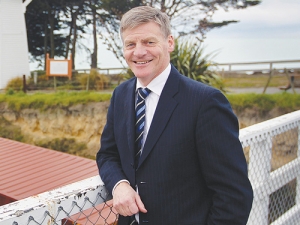State of the Dairy Nation 2024/25: DairyNZ Highlights Record Milk Production and Export Growth
DairyNZ's chief executive Campbell Parker says the 2024/25 dairy season reinforces the importance of the dairy sector to New Zealand.
 Deputy Prime Minister Bill English believes farmers are working with their banks and adjusting well.
Deputy Prime Minister Bill English believes farmers are working with their banks and adjusting well.
Readjust, stick with your banks and keep supporting your dairy company; things will come right.
That's the message from Deputy Prime Minister and Finance Minister Bill English to dairy farmers nearing the end of their second season of low milk payout.
English, headline speaker at next month's DairyNZ Farmers Forum in Hamilton, believes farmers are adapting well.
"They're in a tough patch lasting longer than people expected but they are adapting pretty well in the short term," he told Dairy News.
"We see an industry doing the things they need to do; farmers are not just sitting around complaining. Dairy farmers are addressing problems in cost structures and so far have convinced their financiers to back them."
The Government shares the industry's confidence in its long term future. Dairying will bounce back, he says.
"There are bound to be farmers who have to make short term decisions under a bit of pressure.
"We would expect that when the industry has had a good run for so long there would be a build of costs and debt.
"As long as they readjust and the banks stick with them and they continue to support their dairy company, we think it will come right. We think they will be there to benefit when it comes right."
The Government is keen to see farmers and banks stick together; they have good reasons to do so.
"The farmers can see a long term future and they need to persuade the banks they will be profitable customers in the future," says English.
"The banks' interest is that they don't act in a way that reduces equity in farms to the point where it represents a risk to the debt."
The Government checks in with banks regularly about their view of the dairy industry; banks are seen by the Government as cautious but positive.
For its part, the Government continues spending on science and R&D which in the long run will lead to a more competitive industry that could weather downturns better, English says.
The Government is also looking at securing better market access for our dairy products.
On Fonterra's performance, the deputy PM says during a downturn there is always a temptation to blame the company; however that's a product of world supply.
"You can't expect Fonterra to be setting the world price."
He is confident that whatever Fonterra is discussing with its shareholders it is helping farmers maintain a cohesive and confident view of the future.
Fonterra is expecting milk production to be lower by 4% this season. English says this allows the co-op to focus on its volume-to-value strategy. More milk is going into higher value products.
Shareholders and the Government would like to think more could have happened sooner, English says.
"But Fonterra has had to deal with this big surge in production over recent years so they are now well geared up with the right attitude to push more volume into high value added products.
"In five years that's how farmers will judge them: on how the co-op has succeeded in turning more milk into high value products."
However, English notes that higher value added products would always be risky investments; Fonterra's product range will always be underpinned by a base load of competitive production of milk powder commodity type products.
"The two go together and I think Fonterra has turned out to be pretty good at making milk powder and they always will be processing a portion of that."
Recent weather events in the Bay of Plenty, Gisborne/Tairawhiti, and Canterbury have been declared a medium-scale adverse event.
DairyNZ's chief executive Campbell Parker says the 2024/25 dairy season reinforces the importance of the dairy sector to New Zealand.
A New Zealand agribusiness helping to turn a long-standing animal welfare and waste issue into a high-value protein stream has won the Australian dairy sector's top innovator award.
OPINION: A bumper season all around.
Dairy Women's Network (DWN) has announced that Taranaki dairy farmer Nicola Bryant will join its Trust Board as an Associate Trustee.
Rural Women New Zealand (RWNZ) says it welcomes the release of a new report into pay equity.
OPINION: Staying with politics, with less than nine months to go before the general elections, there’s confusion in the Labour…
OPINION: Winston Peters' tirade against the free trade deal stitched with India may not be all political posturing by the…